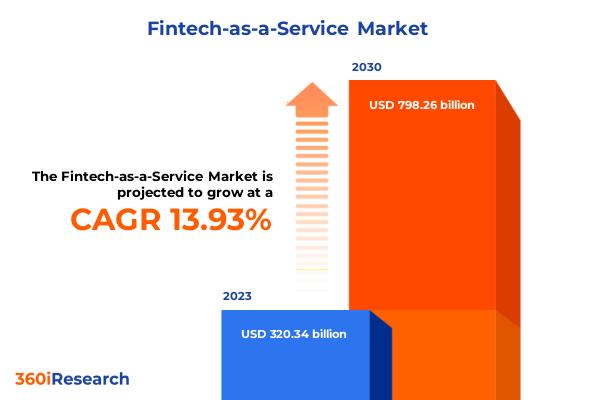Fintech
Fintech-as-a-Service Market Worth $798.26 Billion by 2030

Fintech-as-a-Service Market | 360iSearch
The “Fintech-as-a-Service Market by Type (Funds Transfer, Lending, Payment), Application (Regulatory Compliance & Support, Fraud Monitoring, KYC Verification), End User – Global Forecast 2024-2030” report has been added to The offer of 360iResearch.com.
Request a free sample report @ https://www.360iresearch.com/library/intelligence/fintech-as-a-service?utm_source=openpr&utm_medium=referral&utm_campaign=sample
“Key Factors Fueling the Growth of the Fintech-as-a-Service Market”
The Fintech-as-a-Service sector is experiencing rapid growth driven by growing demand for integrated financial services, which streamline banking, payments and financial management into a single, efficient platform that reduces business costs. Improved regulatory policies that support digital innovation and data security further accelerate this trend by facilitating market entry and improving stability. Also contributing to the expansion are significant traction from end-user segments such as banking, retail and e-commerce, which seek scalable digital financial solutions, and strategic partnerships between innovative fintech companies and established financial entities. Entering underdeveloped markets and introducing versatile services that include payment processing, risk management and compliance solutions enable Fintech-as-a-Service to provide cost-effective alternatives to traditional financial systems, encouraging continued market penetration and growth. These multifaceted factors collectively support the solid development and future prospects of the Fintech-as-a-Service sector.
“The main challenges hindering the expansion of Fintech-as-a-Service markets”
The Fintech-as-a-Service sector, while promising, is grappling with several growth constraints that deserve attention. High implementation costs create a substantial barrier, particularly for startups and small businesses. Together with the lack of standardized products, this results in compatibility issues, discouraging potential users interested in interoperability and quality assurance. The sector also faces strong competition from alternative technologies, including sophisticated traditional banking systems and emerging decentralized financial platforms, which could divert investments. Furthermore, regulatory challenges and the need for tailored solutions impede the commercialization and scalability of these platforms, limiting their adoption to less regulated niche markets. Additionally, the limited scope of some product features forces users to seek additional services, further complicating implementation and increasing costs. Collectively addressing these constraints is critical to catalyzing the broader adoption and success of Fintech-as-a-Service solutions.
“Fintech-as-a-Service: Promoting innovation and inclusion through the dynamics of emerging markets”
Governments around the world are increasingly aligning themselves with advances in fintech by strengthening regulatory measures that protect data and secure financial transactions. Initiatives such as the EU’s Payment Services Directive (PSD2) have catalyzed a competitive and innovative financial landscape by welcoming new players. Additionally, a rising wave of venture capital demonstrates market confidence, allowing fintech startups to accelerate their technological innovations in payment systems, personal finance and more. Strategic alliances between traditional banks and fintech companies are improving financial services that cater to diverse consumer bases, bolstered by technological advances in cloud computing and APIs that enable scalability without heavy infrastructure. Furthermore, government support through special economic zones and innovation hubs amplifies research and development in the fintech sector, while collaborations between public sectors and private fintech entities are key in promoting financial inclusion through innovative payment solutions and educational initiatives. These efforts collectively foster a robust, inclusive, and rapidly evolving fintech-as-a-service industry poised to efficiently meet global financial services needs.
“Navigating the Complexities of Fintech-as-a-Service: Key Challenges for Market Growth”
As the Fintech-as-a-Service (FaaS) industry evolves, it faces several crucial challenges that could hinder its expansion and operational effectiveness. Integrating innovative fintech solutions with traditional financial systems poses significant challenges due to the different nature of existing infrastructures and stringent compliance requirements. Additionally, there is a critical shortage of skilled professionals capable of managing both the technological and regulatory needs of FaaS, complicating efforts to scale these solutions. Environmental concerns also come into play; Despite fintech’s digital foundation, its reliance on energy-intensive data centers and blockchain technology requires urgent measures to reduce its carbon footprint. Additionally, the rapid pace of technological advances in the industry requires vigilance to protect against potential long-term risks such as data security breaches, privacy concerns, and systemic financial disruptions. Addressing these challenges is vital to sustain growth and foster innovation in the fintech sector.
Inquire before you buy @ https://www.360iresearch.com/library/intelligence/fintech-as-a-service?utm_source=openpr&utm_medium=referral&utm_campaign=inquire
Market segmentation and coverage:
This research report categorizes the Fintech-as-a-Service market in order to forecast revenue and analyze trends in each of the following submarkets:
Based on the type, the market is studied through fund transfer, lending and payment.
Depending on the application, the market is studied through regulatory support and compliance, fraud monitoring and KYC verification.
Based on the end user, the market is studied across banks, financial lending companies and insurance companies.
Based on region, the market is studied in the Americas, Asia-Pacific, and Europe, Middle East & Africa. The Americas are further studied in Argentina, Brazil, Canada, Mexico and the United States. The United States is further studied in California, Florida, Illinois, New York, Ohio, Pennsylvania and Texas. Asia-Pacific is further studied in Australia, China, India, Indonesia, Japan, Malaysia, Philippines, Singapore, South Korea, Taiwan, Thailand, and Vietnam. Europe, the Middle East and Africa are further studied in Denmark, Egypt, Finland, France, Germany, Israel, Italy, Netherlands, Nigeria, Norway, Poland, Qatar, Russia, Saudi Arabia, South Africa, Spain, Sweden, Switzerland, Turkey, United Arab Emirates and United Kingdom.
Key Company Profiles:
The report delves into significant recent developments in the Fintech-as-a-Service market, highlighting key vendors and their innovative profiles. These include Afterpay Limited, Betterment LLC, Early Warning Services, LLC, Envestnet Asset Management, Inc., Intuit Inc., Mastercard International Incorporated, Payoneer Inc., PayPal, Inc., Railsbank Technology Ltd., Rapyd Financial Network Ltd., Revolut Ltd., Robinhood Financial LLC, Solid Financial Technologies, Inc., Stripe, Inc. and Synctera.
Introducing ThinkMi Query: Revolutionizing Market Intelligence with AI-Powered Insights for the Fintech-as-a-Service Market
We proudly present ThinkMi Query, a cutting-edge AI product designed to transform the way businesses interact with the Fintech-as-a-Service marketplace. ThinkMi Query stands out as your premier market intelligence partner, delivering unmatched insights with the power of artificial intelligence. Whether deciphering market trends or offering actionable insights, ThinkMi Query is designed to provide precise, relevant answers to your most critical business questions. This revolutionary tool is much more than just a source of information; is a strategic resource that empowers your decision making with up-to-the-minute data, ensuring you stay ahead of the curve in the highly competitive Fintech-as-a-Service market. Embrace the future of market analytics with ThinkMi Query, where informed decisions lead to remarkable growth.
Ask a question at ThinkMi Query @ https://www.360iresearch.com/library/intelligence/fintech-as-a-service?utm_source=openpr&utm_medium=referral&utm_campaign=query
Main topics covered:
1. Preface
2. Research methodology
3. Executive summary
4. Market Overview
5. Market insights
6. Fintech-as-a-Service market, by type
7. Fintech-as-a-Service Market, by Application
8. Fintech-as-a-Service market, by end user
9. American Fintech-as-a-Service market
10. Asia-Pacific Fintech-as-a-Service Market
11. Fintech-as-a-Service Market in Europe, Middle East and Africa
12. Competitive landscape
13. Competitive portfolio
Read more @ https://www.360iresearch.com/library/intelligence/fintech-as-a-service?utm_source=openpr&utm_medium=referral&utm_campaign=analyst
Contact 360iResearch
Mr Ketan Rohom
Sales and Marketing,
Office no. 519, Empress Nyati,
Opposite the market town of Phoenix,
Vimannagar, Pune, Maharashtra,
India-411014.
sales@360iresearch.com
+1-530-264-8485
+91-922-607-7550
About 360iResearch
360iResearch is a market research and business consultancy firm based in India, with clients and focus markets across the world.
We are a dynamic and agile company that believes in setting ambitious and proactive goals and achieving them with the support of our greatest asset: our people.
With our feet ready, we are attentive to information and market volatility. Our market intelligence is diligent, real-time and tailored to your needs, providing you with all the information that enables strategic decision making.
Our customer base includes approximately 80% of the Fortune Global 500 companies, as well as leading research and consulting firms and academic institutions that rely on our expertise in compiling data in niche markets. Our meta-insights are intelligent, impactful and infinite, resulting in actionable data that supports your quest for greater profitability, tapping into niche markets and exploring new revenue opportunities.
This version was published on openPR.
Fintech
US Agencies Request Information on Bank-Fintech Dealings

Federal banking regulators have issued a statement reminding banks of the potential risks associated with third-party arrangements to provide bank deposit products and services.
The agencies support responsible innovation and banks that engage in these arrangements in a safe and fair manner and in compliance with applicable law. While these arrangements may offer benefits, supervisory experience has identified a number of safety and soundness, compliance, and consumer concerns with the management of these arrangements. The statement details potential risks and provides examples of effective risk management practices for these arrangements. Additionally, the statement reminds banks of existing legal requirements, guidance, and related resources and provides insights that the agencies have gained through their oversight. The statement does not establish new supervisory expectations.
Separately, the agencies requested additional information on a broad range of arrangements between banks and fintechs, including for deposit, payment, and lending products and services. The agencies are seeking input on the nature and implications of arrangements between banks and fintechs and effective risk management practices.
The agencies are considering whether to take additional steps to ensure that banks effectively manage the risks associated with these different types of arrangements.
SUBSCRIBE TO THE NEWSLETTER
And get exclusive articles on the stock markets
Fintech
What changes in financial regulation have impacted the development of financial technology?

Exploring the complex landscape of global financial regulation, we gather insights from leading fintech leaders, including CEOs and finance experts. From the game-changing impact of PSD2 to the significant role of GDPR in data security, explore the four key regulatory changes that have reshaped fintech development, answering the question: “What changes in financial regulation have impacted fintech development?”
- PSD2 revolutionizes access to financial technology
- GDPR Improves Fintech Data Privacy
- Regulatory Sandboxes Drive Fintech Innovation
- GDPR Impacts Fintech Data Security
PSD2 revolutionizes access to financial technology
When it comes to regulatory impact on fintech development, nothing comes close to PSD2. This EU regulation has created a new level playing field for market players of all sizes, from fintech startups to established banks. It has had a ripple effect on other markets around the world, inspiring similar regulatory frameworks and driving global innovation in fintech.
The Payment Services Directive (PSD2), the EU law in force since 2018, has revolutionized the fintech industry by requiring banks to provide third-party payment providers (TPPs) with access to payment services and customer account information via open APIs. This has democratized access to financial data, fostering the development of personalized financial instruments and seamless payment solutions. Advanced security measures such as Strong Customer Authentication (SCA) have increased consumer trust, pushing both fintech companies and traditional banks to innovate and collaborate more effectively, resulting in a dynamic and consumer-friendly financial ecosystem.
The impact of PSD2 has extended beyond the EU, inspiring similar regulations around the world. Countries such as the UK, Australia and Canada have launched their own open banking initiatives, spurred by the benefits seen in the EU. PSD2 has highlighted the benefits of open banking, also prompting US financial institutions and fintech companies to explore similar initiatives voluntarily.
This has led to a global wave of fintech innovation, with financial institutions and fintech companies offering more integrated, personalized and secure services. The EU’s leadership in open banking through PSD2 has set a global standard, promoting regulatory harmonization and fostering an interconnected and innovative global financial ecosystem.
Looking ahead, the EU’s PSD3 proposals and Financial Data Access (FIDA) regulations promise to further advance open banking. PSD3 aims to refine and build on PSD2, with a focus on improving transaction security, fraud prevention, and integration between banks and TPPs. FIDA will expand data sharing beyond payment accounts to include areas such as insurance and investments, paving the way for more comprehensive financial products and services.
These developments are set to further enhance connectivity, efficiency and innovation in financial services, cementing open banking as a key component of the global financial infrastructure.
General Manager, Technology and Product Consultant Fintech, Insurtech, Miquido
GDPR Improves Fintech Data Privacy
Privacy and data protection have been taken to another level by the General Data Protection Regulation (GDPR), forcing fintech companies to tighten their data management. In compliance with the GDPR, organizations must ensure that personal data is processed fairly, transparently, and securely.
This has led to increased innovation in fintech towards technologies such as encryption and anonymization for data protection. GDPR was described as a top priority in the data protection strategies of 92% of US-based companies surveyed by PwC.
Financial Expert, Sterlinx Global
Regulatory Sandboxes Drive Fintech Innovation
Since the UK’s Financial Conduct Authority (FCA) pioneered sandbox regulatory frameworks in 2016 to enable fintech startups to explore new products and services, similar frameworks have been introduced in other countries.
This has reduced the “crippling effect on innovation” caused by a “one size fits all” regulatory approach, which would also require machines to be built to complete regulatory compliance before any testing. Successful applications within sandboxes give regulators the confidence to move forward and address gaps in laws, regulations, or supervisory approaches. This has led to widespread adoption of new technologies and business models and helped channel private sector dynamism, while keeping consumers protected and imposing appropriate regulatory requirements.
Co-founder, UK Linkology
GDPR Impacts Fintech Data Security
A big change in financial regulations that has had a real impact on fintech is the 2018 EU General Data Protection Regulation (GDPR). I have seen how GDPR has pushed us to focus more on user privacy and data security.
GDPR means we have to handle personal data much more carefully. At Leverage, we have had to step up our game to meet these new rules. We have improved our data encryption and started doing regular security audits. It was a little tricky at first, but it has made our systems much more secure.
For example, we’ve added features that give users more control over their data, like simple consent tools and clear privacy notices. These changes have helped us comply with GDPR and made our customers feel more confident in how we handle their information.
I believe that GDPR has made fintech companies, including us at Leverage, more transparent and secure. It has helped build trust with our users, showing them that we take data protection seriously.
CEO & Co-Founder, Leverage Planning
Related Articles
Fintech
M2P Fintech About to Raise $80M

Application Programming Interface (API) Infrastructure Platform M2P Financial Technology has reached the final round to raise $80 million, at a valuation of $900 million.
Specifically, M2P Fintech, formerly known as Yap, is closing a new funding round involving new and existing investors, according to entrackr.com. The India-based company, which last raised funding two and a half years ago, previously secured $56 million in a round led by Insight Partners, earning a post-money valuation of $650 million.
A source indicated that M2P Fintech is ready to raise $80 million in this new funding round, led by a new investor. Existing backers, including Insight Partners, are also expected to participate. The new funding is expected to go toward enhancing the company’s technology infrastructure and driving growth in domestic and international markets.
What does M2P Fintech do?
M2P Fintech’s API platform enables businesses to provide branded financial services through partnerships with fintech companies while maintaining regulatory compliance. In addition to its operations in India, the company is active in Nepal, UAE, Australia, New Zealand, Philippines, Bahrain, Egypt, and many other countries.
Another source revealed that M2P Fintech’s valuation in this funding round is expected to be between USD 880 million and USD 900 million (post-money). The company has reportedly received a term sheet and the deal is expected to be publicly announced soon. The Tiger Global-backed company has acquired six companies to date, including Goals101, Syntizen, and BSG ITSOFT, to enhance its service offerings.
According to TheKredible, Beenext is the company’s largest shareholder with over 13% ownership, while the co-founders collectively own 34% of the company. Although M2P Fintech has yet to release its FY24 financials, it has reported a significant increase in operating revenue. However, this growth has also been accompanied by a substantial increase in losses.
Fintech
Scottish financial technology firm Aveni secures £11m to expand AI offering

By Gloria Methri
Today
- To come
- Aveni Assistance
- Aveni Detection
Artificial intelligence Financial Technology Aveni has announced one of the largest Series A investments in a Scottish company this year, amounting to £11 million. The investment is led by Puma Private Equity with participation from Par Equity, Lloyds Banking Group and Nationwide.
Aveni combines AI expertise with extensive financial services experience to create large language models (LLMs) and AI products designed specifically for the financial services industry. It is trusted by some of the UK’s leading financial services firms. It has seen significant business growth over the past two years through its conformity and productivity solutions, Aveni Detect and Aveni Assist.
This investment will enable Aveni to build on the success of its existing products, further consolidate its presence in the sector and introduce advanced technologies through FinLLM, a large-scale language model specifically for financial services.
FinLLM is being developed in partnership with new investors Lloyds Banking Group and Nationwide. It is a large, industry-aligned language model that aims to set the standard for transparent, responsible and ethical adoption of generative AI in UK financial services.
Following the investment, the team developing the FinLLM will be based at the Edinburgh Futures Institute, in a state-of-the-art facility.
Joseph Twigg, CEO of Aveniexplained, “The financial services industry doesn’t need AI models that can quote Shakespeare; it needs AI models that deliver transparency, trust, and most importantly, fairness. The way to achieve this is to develop small, highly tuned language models, trained on financial services data, and reviewed by financial services experts for specific financial services use cases. Generative AI is the most significant technological evolution of our generation, and we are in the early stages of adoption. This represents a significant opportunity for Aveni and our partners. The goal with FinLLM is to set a new standard for the controlled, responsible, and ethical adoption of generative AI, outperforming all other generic models in our select financial services use cases.”
Previous Article
Network International and Biz2X Sign Partnership for SME Financing
IBSi Daily News Analysis

SMBs Leverage Cloud to Gain Competitive Advantage, Study Shows
IBSi FinTech Magazine

- The Most Trusted FinTech Magazine Since 1991
- Digital monthly issue
- Over 60 pages of research, analysis, interviews, opinions and rankings
- Global coverage
subscribe now
-

 DeFi12 months ago
DeFi12 months agoDeFi Technologies Appoints Andrew Forson to Board of Directors
-

 Fintech12 months ago
Fintech12 months agoUS Agencies Request Information on Bank-Fintech Dealings
-

 News1 year ago
News1 year agoBlock Investors Need More to Assess Crypto Unit’s Earnings Potential, Analysts Say — TradingView News
-

 DeFi12 months ago
DeFi12 months agoSwitchboard Revolutionizes DeFi with New Oracle Aggregator
-

 DeFi12 months ago
DeFi12 months agoIs Zypto Wallet a Reliable Choice for DeFi Users?
-

 News1 year ago
News1 year agoBitcoin and Technology Correlation Collapses Due to Excess Supply
-

 Fintech12 months ago
Fintech12 months agoWhat changes in financial regulation have impacted the development of financial technology?
-

 Fintech12 months ago
Fintech12 months agoScottish financial technology firm Aveni secures £11m to expand AI offering
-

 Fintech12 months ago
Fintech12 months agoScottish financial technology firm Aveni raises £11m to develop custom AI model for financial services
-

 News1 year ago
News1 year agoValueZone launches new tools to maximize earnings during the ongoing crypto summer
-

 Videos6 months ago
Videos6 months ago“Artificial intelligence is bringing us to a future that we may not survive” – Sco to Whitney Webb’s Waorting!
-

 DeFi1 year ago
DeFi1 year agoTON Network Surpasses $200M TVL, Boosted by Open League and DeFi Growth ⋆ ZyCrypto
















